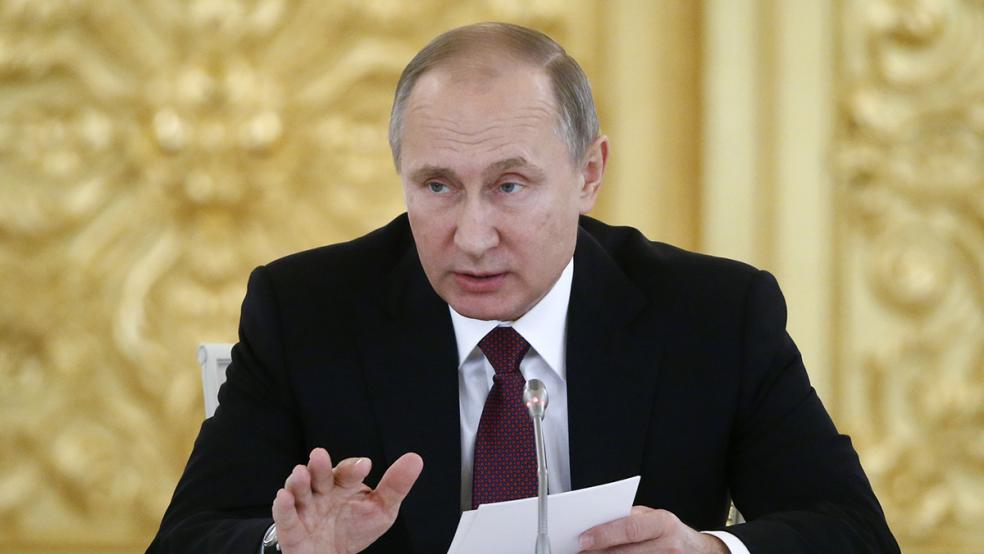Hillary Clinton and John McCain ramped up Russia demonization to new levels this week. Politicians, intelligence officials, generals and cable TV pundits are trying to convince us that the Putin regime is a mortal threat to the American way of life and must be stopped at all costs. These claims are not only exaggerated, but they are also foolish. Fanning conflict with a nuclear power capable of annihilating the entire world is never a good idea.
On Monday, McCain told an interviewer that Putin is a greater threat than ISIS and urged further sanctions based on the accusation that Russia tried to change the results of our election. With respect to the ISIS comparison, it is certainly true that Russia has much more weaponry than the terrorist group, but, unlike ISIS, Putin’s regime is not decapitating Americans and is not urging lone wolves to engage in shooting and bombing sprees on U.S. soil. And as former Director of National Intelligence James Clapper told CNN this week, the intelligence community “had neither the authority, the expertise, nor the capability to assess whether or not this interference actually affected the outcome of the election.”
Related:Putin’s Just Trolling the World Now on Trump and the US Election
On Wednesday, Clinton essentially accused the Trump campaign of conspiring with Russia to “weaponize” leaked information against her. As evidence, she cited the timing of WikiLeaks’ John Podesta email message dump. The emails appeared on WikiLeaks less than an hour after the leak of an Access Hollywood video in which Trump bragged about forcing himself upon women.
McCain, Clinton and others are amplifying the U.S. intelligence community’s public indictment of Russia for its election meddling that was issued during the closing days of the Obama administration. The report alleges that through its public statements, intelligence operations and propaganda efforts, the Putin regime sought to swing the election toward Trump.
The most serious allegation is that Russian operatives hacked DNC emails and then released them via WikiLeaks in an effort to damage the Clinton campaign. The report does not provide hard evidence to substantiate this claim, and public assertions made by the intelligence community should be treated with skepticism. After all, it was this same intelligence community that concluded In October 2002 that Saddam Hussein was producing chemical and biological weapons. Further, as director of national intelligence, Clapper lied to Congress in 2013 when he denied that the NSA collects data on Americans.
More importantly, even assuming the allegations are true, they do not lead to the immediate conclusion that Russia is a mortal enemy. Friendly countries spy on one another and try to influence each other’s elections all the time. For example, President Obama called on British voters to reject Brexit, and the U.S. National Security Agency appears to have bugged German Prime Minister Angela Merkel’s mobile phone.
Related: US Military Spending Still Makes China, Russia Look Small
Israel has long sought to influence U.S. Mideast policy and ran one of the most damaging double agents in American history: Jonathan Pollard. According to the CIA, Pollard's case "has few parallels among known U.S. espionage cases" and that he had "put at risk important U.S. intelligence and foreign policy interests." Yet despite Israel’s aggressive posture, few mainstream U.S. politicians or journalists have portrayed that nation as a hostile power.
It is true that the Putin government has some brutally undemocratic inclinations, including a history of assassinating political opponents. But the U.S. has maintained and continues to maintain friendly relations with despotic nations, usually for economic reasons or national security. During World War II, President Roosevelt allied with Joseph Stalin. In 1971, President Nixon visited China’s Mao Zedong not long after his Great Leap Forward and Cultural Revolution killed tens of millions of Chinese. Today, many foreign policy experts — and President Trump — support improved relations with Saudi Arabia, a nation with no democratic rights that stones women to death for adultery. So, Putin’s despotism alone does not justify treating him with hostility.
What threat does Putin truly pose? Well, Russia is America’s rival for influence on the world stage. And this seems to be why our generals and intelligence operatives along with their supporters in Congress, think tanks and the media dislike Putin so much. While the foreign affairs intelligentsia views the world as a chessboard on which our main goal is to outmaneuver and overpower our Russian rival, this approach to geopolitics is contrary to the interests of ordinary Americans. The vast majority of us don’t benefit from engaging in international conflicts, especially when domestic security is not at stake.
Related: Trump Budget Finds $0 in Wasteful Pentagon Programs. Are They Kidding?
A friendlier approach to Russia, on the other hand, could have its benefits. Russia provided intelligence that, if handled properly by the FBI, could have prevented the Tsarnaev brothers from bombing the Boston marathon. Aside from being a partner in the struggle against Islamist terrorism, Russia can also be a source of energy resources and technical talent.
While cooperating with Russia – where possible – can benefit the general public, increased antagonism benefits only the military industrial complex that can bulk up its budgets on the back of fear and hysteria. Leaders of both major parties are now falling over each other to show who can be tougher on Russia and more muscular on foreign policy generally.
The result will be a greater reluctance by Trump administration officials to engage with their Russian counterparts, more hostile rhetoric and more geopolitical maneuvering. This environment will increase the risk of proxy wars, which, could, in turn, produce direct hostilities. A greater risk of war between the world’s strongest nuclear powers should concern anyone who doesn’t plan to cash in on a future World War.






